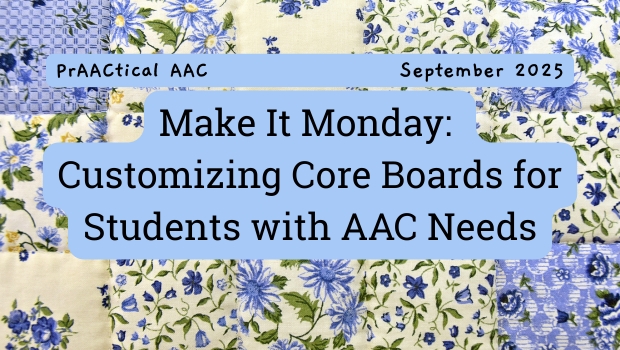Make It Monday: Customizing Core Boards for Students with AAC Needs

At the start of the school year, it’s not uncommon to rely on generic manual communication boards with core vocabulary in situations where students with complex communication tools do not yet have access to robust AAC tools. In a perfect world, we’d immediately provide them with more comprehensive tools that align with their needs and priorities. When it takes more time to put that into place, it’s important to take steps to optimize the communication tools these students will use while they are waiting for a more appropriate AAC solution.
Here are some thoughts on managing that situation.
Generic core boards are usually considered a band-aid and not an acceptable substitute for communication tools that support functional communication or language development. Is it better than nothing? Yes, but let’s be honest with ourselves and acknowledge that, at best, it’s a very temporary fix.
Some customization will need to be done right away to make the core board functional for students who have significant vision and/or motor challenges. They may need larger images or have an adapted layout that makes sense if they’ll be accessing the board through Partner Assisted Scanning.
Other customizations are less urgent but still important. Personalizing the board to add vocabulary that makes it more relevant and meaningful to the student who will be using it is something we can do a week or so after introducing it. That gives us time to connect with family members, teachers, paraprofessionals, and peers who can provide their perspective on what words, phrases, or sentences would be helpful.
There are many ways to add personalized vocabulary to the core board. Templates for adding vocabulary to core boards for Proloquo, Proloquo2Go, WordPower 60 Basic, Project Core, TD Snap, and LAMP Words for Life are part of the Stepping into AAC materials. If you’re looking for a time saver, you can download them for free here.
Filed under: Featured Posts
This post was written by Carole Zangari
